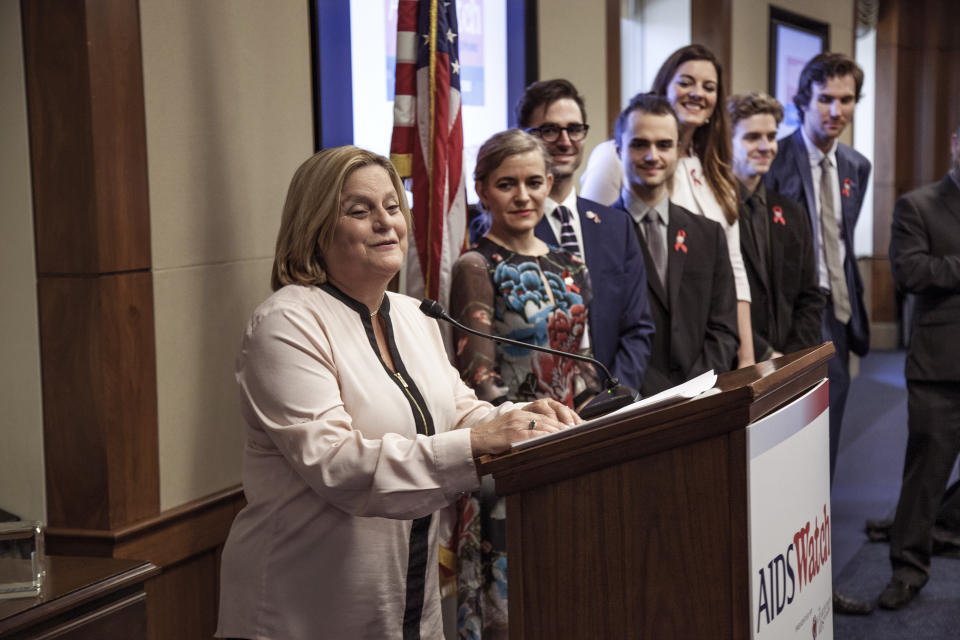What Does Transgender Activist Chandi Moore Have in Common with Elizabeth Taylor?
Chandi Moore, a transgender trailblazer who is active in HIV/AIDS awareness, is finding inspiration in one of Hollywood’s most legendary activists: Elizabeth Taylor.
“She was fearless - out there on the front lines and getting the job done to make things happen,” Moore tells PEOPLE of the late actress, who was one of the first stars to lend her celebrity to HIV/AIDS activism when she co-founded the American Foundation for AIDS Research (amfAR) in 1985 and The Elizabeth Taylor AIDS Foundation in 1991.
Moore was calling in from Washington, D.C., where she joined over 650 people living with HIV and their allies - including five of Taylor’s grandchildren and one of Taylor’s great-grandchildren - on Monday and Tuesday to participate in The Elizabeth Taylor AIDS Foundation and AIDS United’s annual AIDSWatch event.
“It’s very important to me that Elizabeth Taylor’s legacy continues,” Moore says. “By her being a woman who was willing to put herself on the line, someone who is a part of this community should be able to go after it in that same fashion.”
The nation’s largest annual constituent-based national HIV/AIDS advocacy event, AIDSWatch participants met with members of Congress to educate them about the important issues at stake for people living with HIV/AIDS in the United States.

Moore isn’t one to shy away from standing up for what she believes in.
After years of advocacy work for both the transgender community and around HIV/AIDS testing and counseling, Moore gained notoriety for her appearances on E!’s reality show I Am Cait - where she used her fearless voice and kindness to educate Caitlyn Jenner around some of the LGBTQ community’s biggest issues.
“I am one of those fighters who really doesn’t care,” Moore says of her advocacy work. “I’m going to live my life regardless. For me, it’s about making sure the youth that I work with are okay. Because with trans people of color still being murdered, it is a risk for me to walk out my house each day. But there’s someone else out there who is scared and I need to be the one who isn’t so I can be the one to fight for them.”
The CDC estimates there are 1.2 million Americans living with HIV. One of every four is a woman, and two of every three women with HIV is African American. In 2014, young people under the age of 25 accounted for more than 1 in 5 new HIV diagnoses.

Among the concerns for those battling the disease is access to health care. The Affordable Care Act significantly expanded insurance for people living with HIV - its ban on pre-existing condition exclusions and increased premiums based on a person’s health secured reliable coverage for people living with HIV for the first time.
It also required health insurance companies to include a range of services needed to manage HIV (prescription drug benefits, substance use, mental health treatments, preventive services, etc) in their minimum benefits packages.
Many of these issues were addressed Tuesday morning during a rally outside the U.S. Capitol, where speakers like Elizabeth Taylor’s grandson Quinn Tivey spoke to a crowd of hundreds - including Daniel Franzese (Mean Girls).

FROM COINAGE: Top 5 Most Expensive Movie Collectibles
Though Moore has been an ambassador for The Elizabeth Taylor AIDS Foundation for years, this year’s trip to AIDSWatch is her first.
“It’s really been amazing,” she says. “It’s always great when you can get around other people who are fighting the same fight that you are fighting. So far I’ve been able to talk about HIV criminalization, the importance of adolescent sexual health education and access to care for people living with HIV. So it’s been really, really great to have people listen and really get it.”
Asked why more people had showed up to participate in AIDSWatch this year over others, Moore pointed to the rise of activism happening in our society.
“I think that because of our presidency and the things that have been going on politically, it has made people step outside their box and make their voices be heard more than ever,” she says. “People are still not fully educated about prevention and treatment. It really is a very critical time.”

